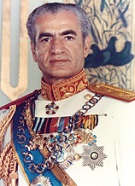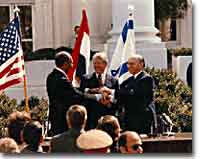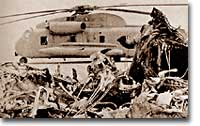58c. Foreign Woes

Palestinian terrorists — like the one seen above — were responsible for the murder of 11 Israeli athletes, coaches, and judges during the 1972 Olympics. The terrorists were hoping to force the release of 200 Arabs being held in Israeli prisons.
America sank deeper into malaise when it looked around at what was going on in the rest of the world.
The decade began with America's longest war ending in its first decisive military defeat in its 200-year-history. Diplomacy seemed powerless to stop the economic dependence of the United States on the volatile Middle East for a steady supply of oil. Terrorists from this region and others threatened heads of state and ordinary citizens around the globe. Despite an auspicious start, relations with the Soviet Union deteriorated by the end of the decade.

Shah Mohammad Reza Pahlavi was the impetus for the 1979 seizure of the U.S. Embassy in Tehran by the Iranian government. The terrorists demanded the return of their former leader Pahlavi in exchange for the lives of 52 American hostages.
Terrorism was on the rise around the globe. The world watched in horror as Arab gunmen cut down eleven Israeli weightlifters at the 1972 Olympics in Munich. The Irish Republican Army (IRA) killed thousands of English and Irish citizens attempting to receive recognition for their cause — an independent homeland. Americans began to see the world slipping into anarchy and felt powerless to fix the problem.
In 1979, the new Islamic fundamentalist government of Iran captured 52 Americans at the US Embassy in Tehran. They demanded the return of their former leader, Shah Mohammed Reza Pahlavi, to Iran in exchange for the lives of the hostages. For 444 days, Americans watched helplessly as their fellow citizens were held in confinement. A rescue effort ordered by President Carter crashed in the desert in April 1980.
Malaise, malaise, malaise.

Though Jimmy Carter's presidency is often remembered for creating a sense of "malaise" throughout America, Carter was able to take a great step towards peace in the Middle East. Here, Carter, Anwar Sadat, and Menachem Begin celebrate the signing of the Camp David Accords.
One exception to these negative trends was the Camp David Agreement, brokered by Carter in 1978. These accords resulted in the mutual recognition of Israel and Egypt, a giant first step toward a lasting peace.
But the U.S.-USSR détente arranged by Nixon and Kissinger was crumbling by the end of the decade. A second arms limitation treaty between the superpowers known as SALT II was delivered to the Senate — only to be rejected. The USSR had surpassed the United States in nuclear warheads. The Cold War became frostier.

After the Iranian government took 52 Americans hostage at the U.S. Embassy in Tehran in 1979, President Carter mounted a rescue effort that ended in tragedy. Eight American pilots participating in "Operation Eagle Claw" lost their lives when two aircraft collided.
A Marxist revolution in Nicaragua brought greater fears of communism spreading to the Western Hemisphere. Finally, in 1979 the Soviet Union invaded Afghanistan with combat troops from the Red Army. Soviet Premier Leonid Brezhnev promised that Afghani leaders had requested military assistance, but American diplomats were dubious.
Fearing Soviet expansion into the Middle East, the Carter Administration strongly condemned the action and levied a wheat boycott on the Soviet Union. The 1980 Olympic Games held in Moscow were boycotted by the United States.
America's claim to dominant status in the world had been seriously challenged, by the end of the 1970s.
So, Americans started looking inward, inside themselves, in the hope of feeling better.






